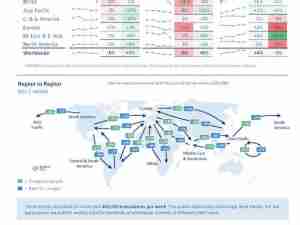"We continue to see a muted recovery in the U.S.," Kuehn told analysts on Thursday at the Bank of America Merrill Lynch Global Transportation Conference in Boston, which was webcast.
UPS, the largest package delivery company, has been tapping into global growth potential by adding a distribution center in Singapore and a direct flight from Hong Kong to Cologne, and building its presence in China, among other efforts.
"The Asia-to-Europe lane continues to be a strong, healthy lane," Kuehn said. "There are a lot of reports of the demise of Europe. Clearly it is in a lot of turmoil, but we continue to see substantial benefits there and really a great story of growth."
He said Korea appeared to be picking up some of the supply chain slack created by Japan's March earthquake and tsunami.
UPS Chief Executive Officer Scott Davis is a member of the President's Export Council, which aims to drive U.S. business by doubling exports by 2015.
UPS's fuel surcharges to shippers are currently 16 percent, but had been more than 30 percent for air shipments when oil hit $140 a barrel in 2008, Kuehn said.
The much higher surcharges three years ago were "extremely disruptive," and customers pushed back by cutting volume, he said. If fuel costs, and surcharges, continue to rise, it will create "more of a fuzzy environment." but Kuehn said the company is confident it can keep yields rising.
Yields refer to revenue per package.
The company's airline fleet is increasingly fuel-efficient. "The oldest plane in our fleet is the 757, an aircraft some people are just starting now to buy," Kuehn said.
"Virtually all of our aircraft purchases going forward will be growth capex; there's really no replacement capex in the foreseeable future." (Reuters)
_-_28de80_-_8f8c6366d00d2f1fde1eee7fbc1f9ce9fbad4504_yes.png)







